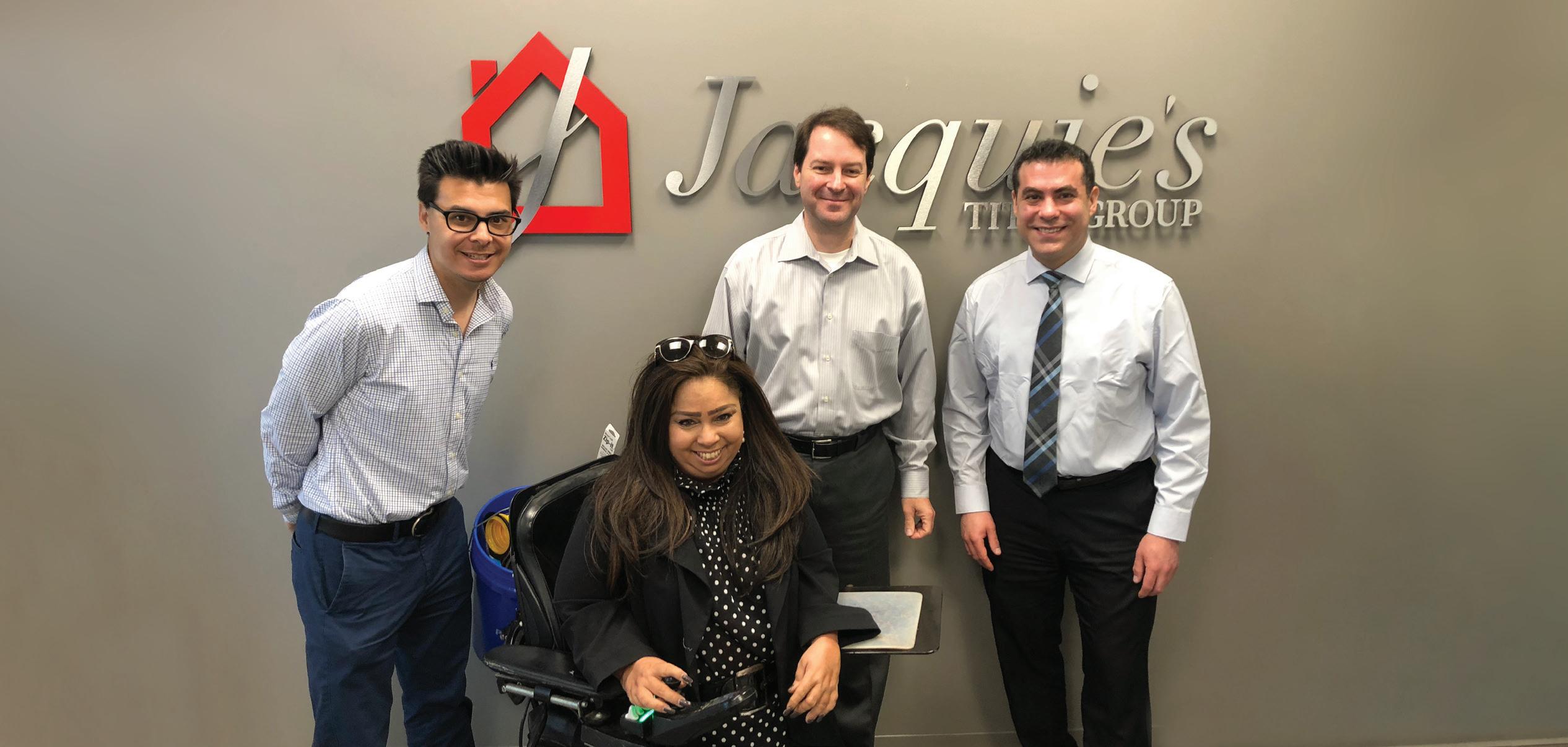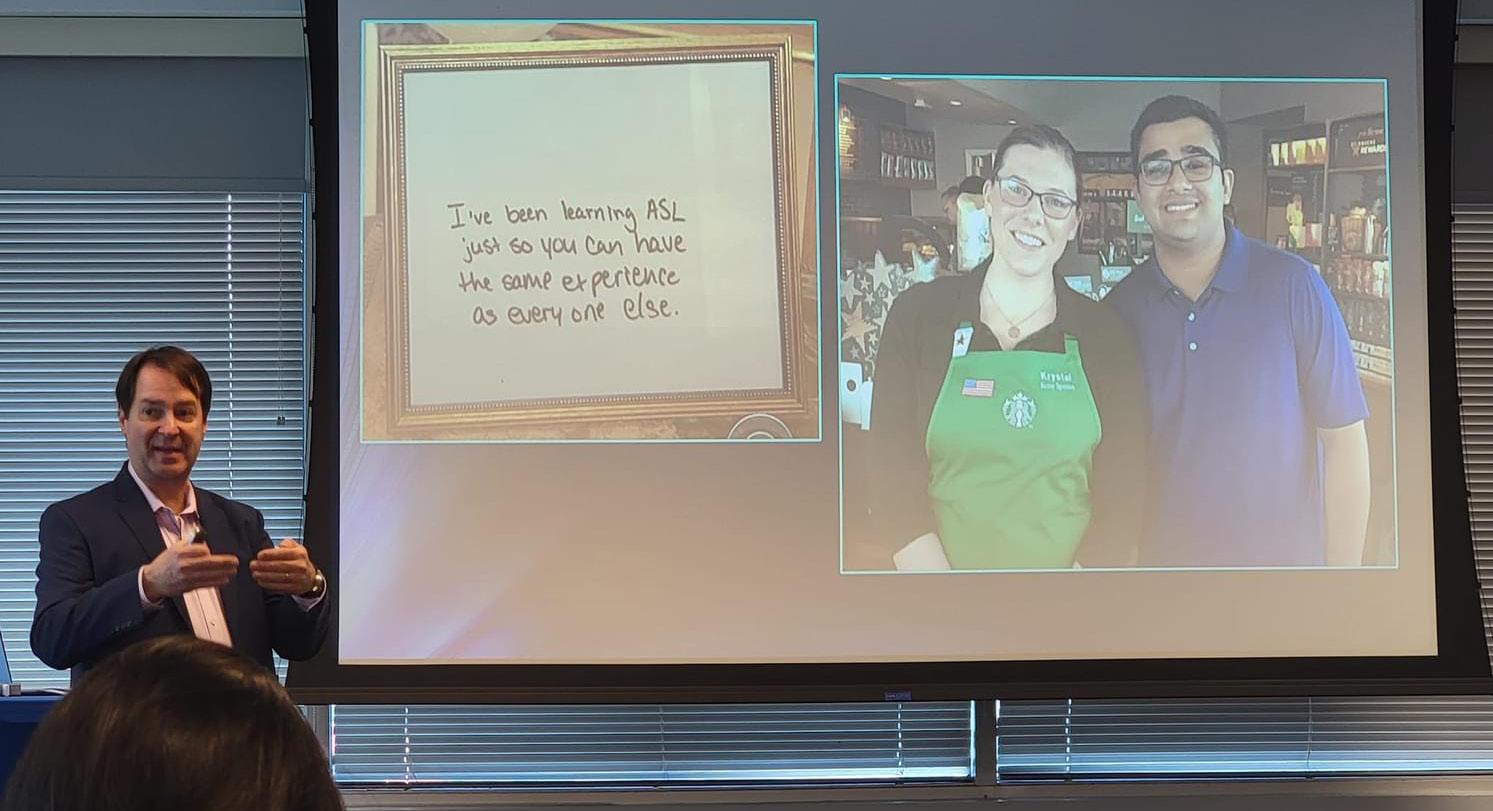
11 minute read
A Focus on Equity for All
DEI Vice Chair John Young shares his experience and lessons learned in working with special needs clients.
John Young, currently serving as Vice Chair of Maryland REALTORS®’ DEI Committee, has worked extensively in helping clients with special needs and disabilities buy and sell homes. It’s a professional and personal journey for John, as he is a parent of a non-verbal daughter with autism. In 2019, John began speaking on serving clients with special needs as he recognized an absence of information that could help REALTORS® be more understanding and work more effectively with clients who have special needs or a disability. At the 2025 Installation and Awards Gala in Ocean City, Maryland REALTORS® recognized the spotlight that John has placed on serving this community and awarded him the DEI Leadership Award. Want to learn more about expanding your base by working with those who would like to be serviced equitably? Please read further.
Maryland REALTORS®: As a REALTOR® serving the community where you live, you found a niche in working with special needs clients. How did this come about?
John Young: Even though I am the parent of a child with special needs—I have a 15-year-old daughter with autism who’s nonverbal—I did not seek out other special needs clients or advertise myself as a special needs REALTOR®. I didn’t put the word out, didn’t even advertise that I’m a special needs parent. But what was happening was that, organically, clients were finding me. One in four Americans identify as having a disability. That number is pretty staggering, and if you think about it you don’t have to put your name out and say, “I’m an advocate for clients with disabilities,” or “I have a special needs child.” They’re going to find you, no matter what. That’s what happened.
I had an agent in Pennsylvania call me and say that he had clients that he wanted to refer to me. He didn’t say, “By the way, I think you are the right fit for them as an agent because you’re the parent of someone with a child with special needs.” The reason he found me, he said, “I read your reviews, and you seem like you’re a person who cares a lot, and you help a lot of people.” This agent then said that this referral needs someone who cares and can provide a personal touch.
MR: No mention of a special need?
Young: He did say they were going to be “challenging,” and he mentioned that they had numerous needs. The agent left it there.
So, yes, I got in touch with them, and we scheduled a time to meet. I was at a coffee shop, waiting for them. When they arrived, I understood why the agent had said they were going to be “challenging.” The woman was severely physically disabled, in a wheelchair. I found out later it was the result of scleroderma, fibromyalgia and juvenile rheumatoid arthritis. Her partner was on the autism spectrum. He had a mental disability and had some behavioral challenges.
Anyway, I did what every REALTOR® does. When you sit down, meeting a new client, you have your intake form, and you’re trying to determine, what do they want? What are their needs? What type of amenities are they looking for? Why are they unhappy with where they’re living now? We needed to discover all the things that were important to take this couple to the next step—and it was a pretty long list of things they needed. They were living in a cramped two-bedroom condo. They needed space for a caregiver because she was to the point where she needed help getting in and out of bed. They needed a place where they could have a live-in nurse sometimes, and they needed public transportation access because she worked in downtown DC. They needed a place where she felt like her partner would be comfortable while she was at work because he didn’t work. And then she added, ‘It’d be great if it had an elevator and a pool.” Their budget was $500,000.
I’m thinking to myself, this is Washington, DC. Where are you going to find a place that’s under $1 million that has all the things they need? Even when clients say they need a place near the Metro, my next question is always, “What’s your budget?” Finding a place near a Metro station can tack $75,000 onto a house or residence.
They said all of this, and then I was a little distracted because I’m thinking, where can I take them? What kind of places are available in their price range?
And then she said, “There’s one other thing that I have to ask, and it’s really the most important thing. We’ve already worked with two other agents, and they let us go.” She paused and put her hand on mine and asked, “Are people like us a waste of time?”
MR: Wow.
Young: It was the way she said it, too. It struck something in me at that moment because I thought about my own daughter, and I thought, one day my wife and I aren’t going to be here for her. We’re not going to live forever. I don’t want anyone looking at our daughter and thinking she’s a waste of time. Nobody is a waste of time.
Anyway, after our conversation, I was overwhelmed with what was shared. I went back to my car and cried. It was a turning point in my career as a REALTOR® because it made me realize the importance of what we do in the communities we serve. Yes, we find homes for a lot of people, but for people with special needs, some are on the side of the highway of life. A lot of people pass them by; nobody stops to help them along the way. I made the decision that I wasn’t going to be another person that does that.
Yes, it was a challenge to find them what they wanted, but we did find a place for them! When it came time for settlement, and I handed them the keys to their place, they cried, and the story came full circle.
But it’s like, what can you do to be better and proactively try to help people? You don’t know what somebody’s going through in life. You have no idea.
MR: How would you define “special needs” to other REALTORS®? It’s a rather broad category, isn’t it?
Young: One of the things that I always talk about when I present on special needs is that when you are working with someone who has certain challenges, be mindful of language. It’s so important because, believe it or not, the term “special needs” rubs some people in the disability realm the wrong way. They don’t like to be labeled as “special” because they want to be treated equally. I’ve never met anyone with a disability who doesn’t simply just want to feel as if society is treating them like an equal human being. Treat everyone as normal human beings; have some sympathy and empathy.
MR: You’re talking about the “equity” part in DEI.
Young: Correct. The term “special needs,” one of the reasons why I title a lot of my talks “special needs” is that when you’re in the autism world, the term special needs is embraced. I’ve never run into a family with a child with autism that finds that offensive; they embrace the term and understand that it’s not meant to be derogatory.
And yet there are some people in the disability world that have been in that sphere their entire lives who don’t like the term. What I do is I preface my talk by saying that this presentation will encompass all people with disabilities. We all need to understand and respect how other people wish to be addressed.
MR: When it comes to a client of yours who has special needs or a disability, are there things that are differentiate how you would help them, whether they are a buyer or a seller?
Young: Yes. When it comes to buyers, obviously if you have a client with a physical disability, there are a lot of things that you need to be mindful of. Let’s say they weren’t in a wheelchair but still had a mobility issue, using a walker or some assisted device, you might intuitively think, “I have to find a place that doesn’t have a whole lot of steps, like a rambler, for example. But there are other considerations. A person with physical disabilities might not want a house that has different flooring throughout—part wood, part tile, part carpet—these things could affect mobility.
A driveway with a steep slope might prove difficult for some. In our area, some older houses have attached garages with no direct entrance from the house.
A REALTOR® needs to look out for things like that, amongst other considerations. If you’ve got a disability challenge or special need, you may need to have easy access, not only to public transportation, but for medical providers as well, who might need to find the client easily.

You might not want to show a home way in the back of a neighborhood where it’s hard for somebody to find that particular individual, if they have a need for emergency services. You don’t want a house with a large yard that they can’t manage or take care of or any home maintenance that would be above and beyond what they’re physically capable of.
MR: How about sellers with special needs?
Young: From the standpoint of a seller, it’s important that you do everything you can to highlight all the amenities of that home because you are trying to make their home that may have been modified for someone with a disability to appeal to as wide of an audience as possible. And you want to make sure that if there is a buyer’s agent that is working with someone who has a disability, that they know the house has a handicap ramp and/or other amenities. If there are amenities compliant with the American with Disabilities Act, such as grab bars in the shower, it’s important to share all of this in the listing.
MR: Can you share more on the course you teach?
Young: It’s called, “The Do’s and Don’ts of Serving Clients with Special Needs.” The challenge with this talk is that the title doesn’t really tell you everything about it. There are people that might read a title like that and say, “Well, I don’t serve special needs clients, so I’m not going to come.” It’s so much more than just what the title suggests. It will make everyone understand the important role they play in the lives of helping others, and I hope it will instill compassion and understanding for everyone.

I find myself doing this talk multiple times per quarter. I’ve delivered it in over 20 states as of now. It’s an important message that REALTORS® need to hear. It’s made me a better REALTOR®, a better parent, and a better person. My hope is that it does the same for others.

Important Tips!
5 things REALTORS can do to better serve clients with disabilities and special needs:
Listen, observe, and be inclusive
Provide useful information and resources
Preview homes
Consider life stages, adaptability, and the future
Treat clients with special needs like everyone else
5 things REALTORS should be mindful of:
Avoid implicit bias
Don't forget to set expectations and check-in
Don't try to be an expert of everything
Don't assume what clients like or want
Don't wait to ask for help and input from colleagues and family members










